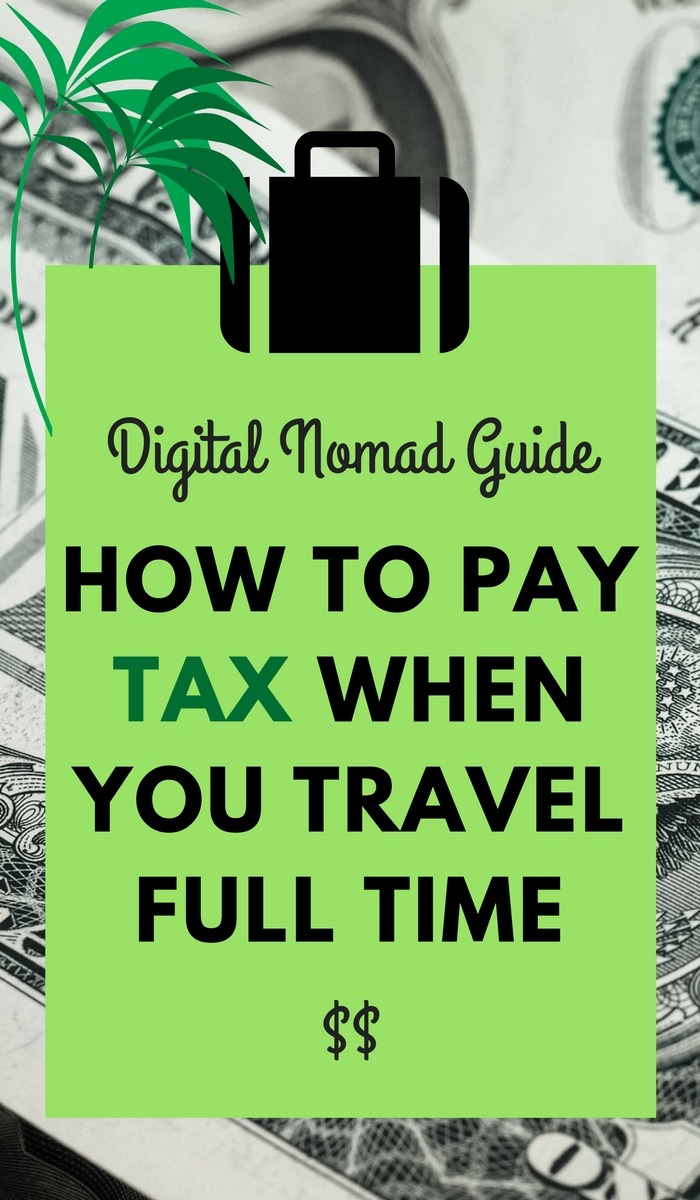Are you about to pack your career into a suitcase and become location independent but confused about tax for digital nomads? This is for you…
Combining work with travel as a digital nomad is an increasingly achievable dream.
The Internet and the evolution of a knowledge-based economy have led to a variety of career opportunities that are completely location independent.
But whether you’re a self-employed self-employed freelancer or an entrepreneur with global aspirations, one area that continues to cause confusion is how to pay tax when you’re constantly on the move.
Tax For Digital Nomads: A Basic Guide To Paying Tax While Traveling
Finding this post about tax for digital nomads helpful? To return easily, pin this to your travel board on Pinterest >>
 The confusion about how to pay tax while traveling is well placed, as the majority of laws were written well before the notion of digital nomadism even existed.
The confusion about how to pay tax while traveling is well placed, as the majority of laws were written well before the notion of digital nomadism even existed.
Legislation hasn’t had time to catch up with the changing work environments of nomadic entrepreneurs, resulting in patchwork and often baffling tax systems.
To make things even more confusing, different countries will also have their own unique set of requirements.
The U.S. for example is one of the only countries in the world that requires its citizens to pay taxes regardless of where they’re living.
How tax for digital nomads works
There are three basic kinds of income tax:
Residential tax
A distinction based on the amount of time you have spent living in one country. Often six months, but this can change according to circumstances
Territorial tax
Based on the work you perform while staying in a country, this can be interpreted as work paid for by locals or anything you create while you’re there
Citizenship tax
Only used by Eritrea and the United States, this system requires citizens to submit tax returns regardless of where they live or how much time they’ve spent there
For freelancers and other creative types, the simplest solution is to register as self-employed in your domicile – in other words, the country where you were born and retain citizenship.
This doesn’t come with any obvious tax benefits, but you do get the usual plus points such as a pension and national healthcare with no extra risks.
As most countries hold double taxation agreements with popular digital nomad destinations, you should only need to pay tax where you’re registered and not where you’re staying.
Some digital nomads with more fully-fledged businesses choose to incorporate in their domicile, and draw earnings from this business structure.
This changes the way your money is taxed, which can be beneficial depending on how much you earn and take out. But it also involves a lot of paperwork and can end up costing you more.
As with any digital nomad tax arrangements, it is best navigated by an accountant who specialises in international tax laws.
Some people claim to have minimised or skipped tax altogether by setting up an offshore business and skipping through territories, meaning they have no obvious tax obligations.
This is sketchy at best and plain illegal at worst, and we strongly advise against it.
Incorporating in a tax-free jurisdiction is precarious under any circumstance, as many countries demand that the business maintains an active physical presence, which is tough when you spend any time traveling.
U.S. Tax Requirements
For U.S. citizens you will be required to pay income tax on your worldwide income even if:
- You live outside the U.S.
- Your business has nothing to do with the U.S.
- You never set foot in the U.S.
- All of your assets are outside the U.S.
For freelancers you’ll only have to declare your income if you exceed the minimum threshold, but at $400 per annum, it basically means that you’ll still need to file U.S. tax returns.
For entrepreneurs with a more established business who have a financial interest in a non-US bank account (corporations, limited liability companies, partnerships, trusts and estates), you will be required to disclose them to the IRS if the value of these accounts exceeds $10,000.
Penalties
Historically, if the IRS found that if you wilfully failed to disclose overseas accounts, you could owe a penalty of 50% of your total balance or $100,000, whichever is greater.
However a recent amendment to legislation stipulates that if your failure is deemed ‘non-wilful’, then the IRS could impose a penalty of $10,000 for every year you didn’t disclose (up to 6 years).
Options to reduce your tax bill
While this all sounds a little bleak, there are options for reducing your U.S. tax bill by using something called the FEIE (foreign earned income exclusion).
The FEIE allows you to pay zero U.S. income tax (up to a limit of $100,800) on any income you earn while living outside the U.S.
There are a couple of different ways to qualify for the FEIE when looking into tax for digital nomads:
Physical presence test
You must demonstrate that you spend at least 330 days outside the U.S. in any 12-month period, typically from 1st January to the 31st December.
Residence test
If you decide to put down more permanent roots you can qualify for the FEIE by passing the “bona fide residence test.”
The test is subjective and the IRS will assess each case individually, taking into consideration the nature and length of your stay abroad.
You must be able to demonstrate that you have an established “residence” in a foreign country, and it’s important to note the difference between “residence” and “domicile”.
A simple (but somewhat morbid) example is that your residence is where you live, but your domicile is where you intend to die.
Basically, if you can demonstrate that you’re on an indefinite work assignment with no intentions to return and live in the US, then that’s what the IRS are looking for.
The benefit of passing the “residence test” is that you’ll be able to visit the US for longer periods than the stipulations outlined under the “physical presence test”.
Local tax in the countries you’re visiting
Residency can be tough to wrap your head around.
As a general rule of thumb, it’s fairly common for countries to treat someone as a resident for tax purposes only if your stay exceeds 6 months.
To reset this time limit you can often exit the country for 24 hours before returning.
However, putting down any roots at all in a country can make you tax liable, depending on how stringently the law is applied.
Many territories count any sort of long term rental as proof that you intend to stay, and draw little distinction between location independent work and non location independent work.
Southeast Asian countries are particularly strict about obtaining work visas, with jail time a very real consequence for flouting immigration rules.
The local tax requirements will obviously vary dependent on the laws of each individual country.
While it’s important to carefully check the specific requirements before you visit a country, common scenarios are likely to be:
- You will not be required to pay income tax as long as you don’t become a resident of the country
- Even if you are a resident, most countries only charge tax on income earned in that country
While becoming a digital nomad certainly has its advantages, it’s important to remember that essentially you’re still running a business.
Failure to comply with the various tax requirements could see you paying more than you should, or it could lead to penalties and/or fines.
Over to you! Leave your questions/answers below…
- Are you about to become location independent and still confused about tax for digital nomads? Have questions? Ask away!
- Got more tips about tax for digital nomads? Please share!

































Comments are closed.